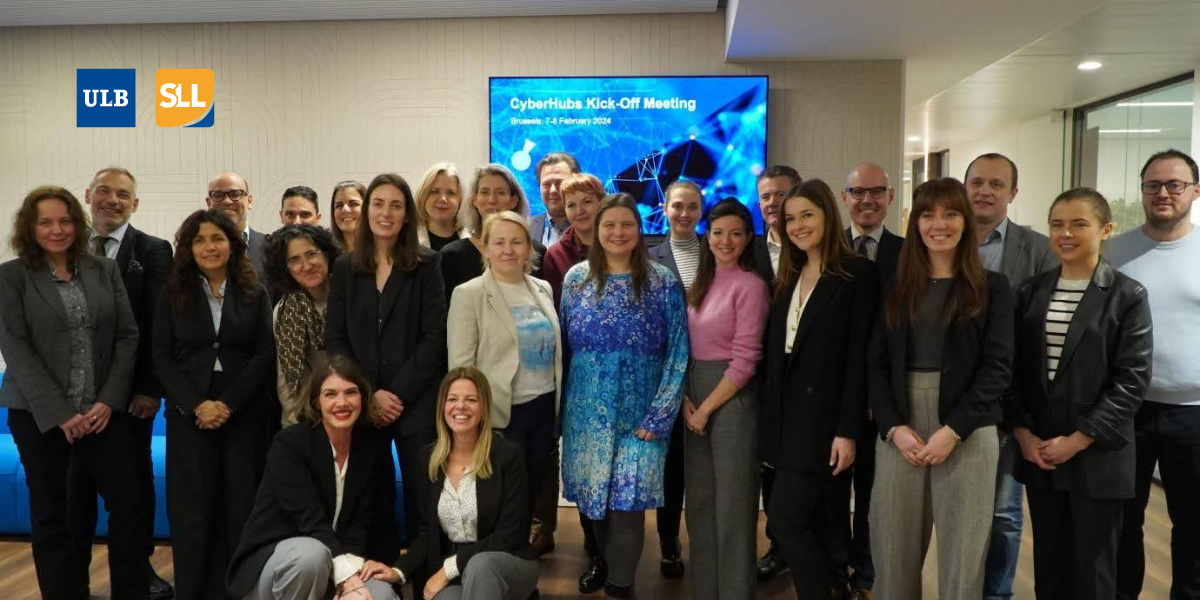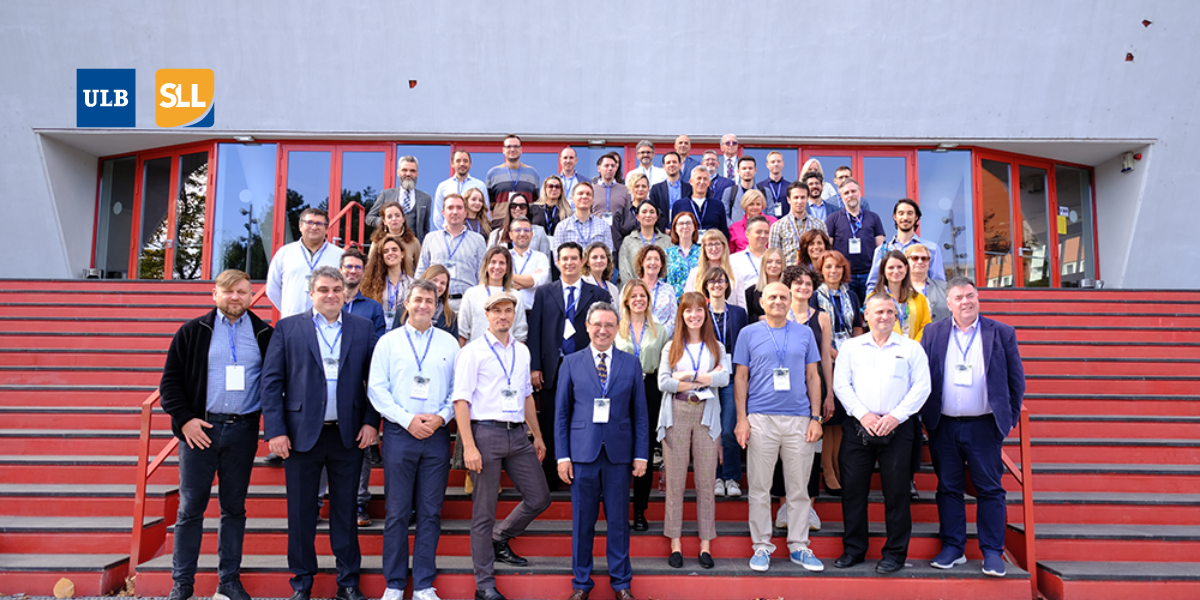Learn more about us.
Executive Master in
Cybersecurity Management
🔔 Only a few seats left for the January intake: apply now!
Won’t you be able to join us for the programme on the 9th of January?
Contact Alina Kobal, Programme Manager to explore your options.
Location
Duration
Frequency
Language
Tuition
Application deadline
Programme start:
Leading Belgian Business School

For whom?
Who is the programme aimed at?
Profile
This programme is intended for professionals requiring managerial and practical knowledge of the six domains representing the pillars of cybersecurity activities and management practices.
Key admissions criteria
- At least 5 years as a digital or cybersecurity manager
- Actively involved in digital or cybersecurity activities and decision-making
- Being national of an EU or a NATO allied European country. Applicants from other countries may be considered on a case-by-case basis.
Your benefits
Why the Executive Master in Cybersecurity Management?
Boost your Cybersecurity management career and focus on essential domains of knowledge and practice. This programme is designed to provide a comprehensive and strategic approach to cybersecurity, equipping you with the expertise needed to manage the evolving landscape of cyber threats. Gain a deeper understanding of crucial cybersecurity concepts, practices, and strategies that are essential for effective leadership in the field.
Aligned with European standards, regulations, and practices, the Executive Master in Cybersecurity Management addresses essential domains of knowledge and fundamental challenges to protect organisations from cyber threats. Thanks to effective pre-readings and an intensive self-research activity during the ACQUIRE part, participants get full access to the following resources during the entire academic year:
- Perlego books database
- ISO Standards in read-only mode
- ISACA membership including all available books, references, journal articles, and bodies of knowledge
- CANVAS Learning Management System with all shared material
Accessible across Europe with a hybrid educational model, designed for cybersecurity professionals. Combine this engaging study experience with your current professional activity.
The course entails:
- Group work in groups of 3-5 on average when developing the business case study for each module.
- Individual pre-reading and research activity with guidance and coaching.
- Lecture from senior experts and guest lecturers during the two days of on-site classes per module.
- Presentation of each group case to the jury at the end of each lecture module.
Information Security Leadership
The core management activities of a modern information security leader include the security governance process, the risk management process, the programme management process and the incident management process. This module will cover the job description of a typical CISO today and where the CISO fits within the organisation including reporting lines and responsibilities, skills and expertise; and talk about the typical challenges CISOs face in their role.
- Topic leader: Marc Vael, Global Security Leader Planning & Coordination at Veralto. Watch his presentation video.
Security Controls
This module will take participants through the process of analysing context, defining scope, modelling threats, defining security controls and requirements, considering the solution space for controls, including technologies and operating models, and then finally evaluating risk (Inherent vs. Residual) and anchoring in policy, assuring that the controls operate as intended, e.g., for internal or external assurance obligations or certification. This part builds on concepts introduced in Module 1.
- Topic leader: Wim Bartsoen, Chief Digital Security Officer at Securitas Group. Watch his presentation video.
Security Architecture
Often people talk about “security-by-design” or “privacy-by-design”. Indeed, security cannot be “bolted on” at a later stage effectively. Better security is embedded “by design” in all layers of your organization’s business, enterprise, and solution architecture and the better it is embedded in your design/delivery as well as run and operations, the better you will be able to understand your security posture and outstanding gaps and risks.
- Topic leader: Erik R. Van Zuuren, Founder at TrustCore.EU. Watch his presentation video.
Security Operations
This module will build upon the concepts of the previous modules where Information Security Governance, the Implementation of Security Controls, and implementing a Secure Architecture are key building blocks to set up a qualitative Security Operations team.
- Topic leader: Remy Knecht, Chief Security Officer at ITSME. Watch his presentation video.
Cybersecurity Battleground
Cybersecurity management practices require the knowledge of own business, its functional and technical vulnerabilities and the threat landscape that needs to be addressed. The capabilities that require building cybersecurity capacity include Identification, Protection, Detection, Response and Recovery techniques and processes.
- Topic leader: Taco Mulder, Chief Information Security Officer at CHU Brugmann. Watch his video presentation.
General Management
Spread over the year
This module will take participants through the basics of General Management dedicated to Cybersecurity and Digital professionals. There will be four parts: Finance, Strategy, Leadership and Human Capital. In the first part, participants will better understand the art and the language of finance. The topics that should be reviewed are the challenges of the income statement, the balance sheet, cash, financial ratios, return on investment and working capital.
- Topic leader: Georges Ataya, Vice President of the Belgian Cybersecurity Coalition. Watch his presentation video.
Faculty
Seasoned practitioners, passionate about their profession.
Blended & Hybrid Education Model
Each module is delivered in two months through self-paced studying and in-person classes ( 2 full days on campus every 2 months). The Blended Learning method is applied for each module as follows:
- Acquire part entails 3 offline weeks of pre-reading guided by a coach and 4-8 hours of self-learning per week. Participants have access to recommended pre-reading materials, ISO standards, PERLEGO, and ISACA membership with several hundred books, articles and bodies of knowledge to complete the "Acquire" part.
- Evaluate part consists of a short questionnaire to check the progress of preparations for 2 full days of classes on-site.
- Build part entails attending classes and workshops during 2 full days on campus, led by an experienced coach and guest speakers who are leading cybersecurity experts.
- Practice part entails working together on a group case study with group peers ( small groups of 3-5 people). Thanks to the knowledge acquired during each module and phase, participants create/develop their management reports to resolve the case study challenges.
- Deliver part - during this phase participants present their module case study with group peers. At the end of each module, participants take a multiple-choice questionnaire for evaluation of acquired knowledge during the module.
Adjusted to your own needs and career targets
- A career development tool is available to participants to identify strong and weak skills based on their self-assessment and the role that they select. On that basis, they adjust their education experience to focus on those domains that they require most.
- Based on the survey results, participants adjust their efforts to focus on those domains that they require the most for the target role. A personal acceptance interview is conducted to formalise the study plan and to level up the participants.
- As a result, both phases 1 (Acquire) and 4 (Case study) are required to address those focus areas.
- An acceptance interview is conducted with each candidate to assess your “fit” with the program, define your goals and motivations to join the programme and outline a study plan.
- Another interview is conducted before graduation to evaluate improvement in those skills that were identified as weak by participants.
Be part of an incredible network of 35.000+ Alumni to never stop learning and evolving. The Solvay Schools Alumni network is one of the largest business networks in Belgium, and its members are present in more than 100 countries around the world. Each year, they organise nearly 50 activities and conferences, providing you with continuing education opportunities, support for your career development, and numerous networking opportunities.

Denisa Kurtagic
Threat Analyst
Ministry of Defense of Montenegro

Siska Hallemeesch
Cyber Security Consultant - Manager
NVISO

Josephina Haex
ICT Director, FPS Policy & Support
BOSA
The master’s made me get into collaborative mode. As a result, at my company, we now have a much more holistic approach to security through transformative, transversal programmes that engage all stakeholders for a better, more resilient organisation.

Marc Samson
Advisory Board Member
ISACA Belgium
The programme helped me integrate different facets of cybersecurity, not just the ones in my comfort zone, making me a more well-rounded professional. This enabled me to better address my clients' needs and guide them on their cyber-resilience journey.

Michel Daher
Chief Information Security Officer
BBE
The true value of this programme lies in its diversity. Learning alongside such a talented community of peers and top leaders in the field was inspiring and empowering. The insights and connections are unmatched.
The Women4Cyber Mari Kert – Saint Aubyn Foundation is a non-profit organisation aimed at
promoting, encouraging, and supporting the participation of women in the field of cybersecurity.
Solvay Lifelong Learning, with the generous contributions of Cyber Security Coalition Belgium, is honoured to offer in collaboration with Women4Cyber three half scholarships for the Executive Master in Cybersecurity Management, in every new cohort.
What is the degree awarded?
How do I finance my training?
DISCOUNTS
- Early bird: Early bird applicants who submit their applications before the end of the early bird date will receive a discount on the tuition fees.
- Alumni of the Solvay Brussels School, Solvay Lifelong Learning, Université libre de Bruxelles and Vrije Universiteit Brussel benefit from a 10% discount on tuition fees.
- Ruling: Your tuition fees may be recognised by the Belgian authorities as professional expenses and could therefore be eligible for a deduction under personal income tax (IPP) and corporate tax (ISOC). This potential tax saving could cover up to 25% of your tuition fees. For more information, please contact us or visit the SPF website.
SCHOLARSHIP
SUBSIDIES & FINANCIAL AIDS
Subject to renewal of the regional agreements
- Brussels Region - Paid Training Leave: Paid educational leave allows workers (private sector) to train during the day or in staggered hours while retaining their salary. Employers receive reimbursement from Brussels Economy and Employment, based on certain criteria. The employee must submit the certificate of enrolment (specific certificate for educational leave issued by the school) to his employer within 20 days of the start of the course. This certificate must be delivered to the employer either by registered mail or with an acknowledgement of receipt. In case of a late registration after the launch of the programme at the latest within 8 days of the registration. (for more information: Economie-Emploi)
- Flanders Region - SME Wallet: The SME e-wallet is oriented towards practitioners of ‘liberal professions’ and SMEs whose operational headquarters are located in the Flemish Region. You have to submit the subsidy application within 14 days of the start of the programme/module/course. (for more information: VLAIO)
- Flanders Region - Paid Training Leave: Under certain conditions, employees in the private sector are entitled to Flemish training leave. They are allowed to be absent from work to attend training or to prepare for evaluations, while their wages continue to be fully paid. The employer can be reimbursed a lump sum as compensation for the wage costs. You have to submit the subsidy application within 14 days of the start of the start of the programme/module/course. (for more information: Vlaanderen)
- Flanders Region - Training Vouchers: You are an employee or you work as a temporary worker and you live or you work in Flanders/Brussels. You can request your training voucher via the WSE counter and you should preferably request the cheque before your registration, so that you can use it to pay your registration fee. (for more information: Vlaanderen)
- Wallonia Region - Training Vouchers: Full or part-time employees from SME which has a maximum of 250 workers as well as self-employed. You have to submit the subsidy application within 14 days of the start of the programme/module/course. (for more information: Forem).
Newsroom
Related blogs

Georges is lecturer and Academic Director of Cybersecurity Management at Solvay Brussels School, Vice-President of the Cybersecurity Coalition and Advisor at Ataya Partners.
15/03/23

Marianna is the Content & Social Media Coordinator at Solvay Brussels School - Lifelong Learning.
30/09/24

Marianna is the Content & Social Media Coordinator at Solvay Brussels School - Lifelong Learning.
30/09/24


